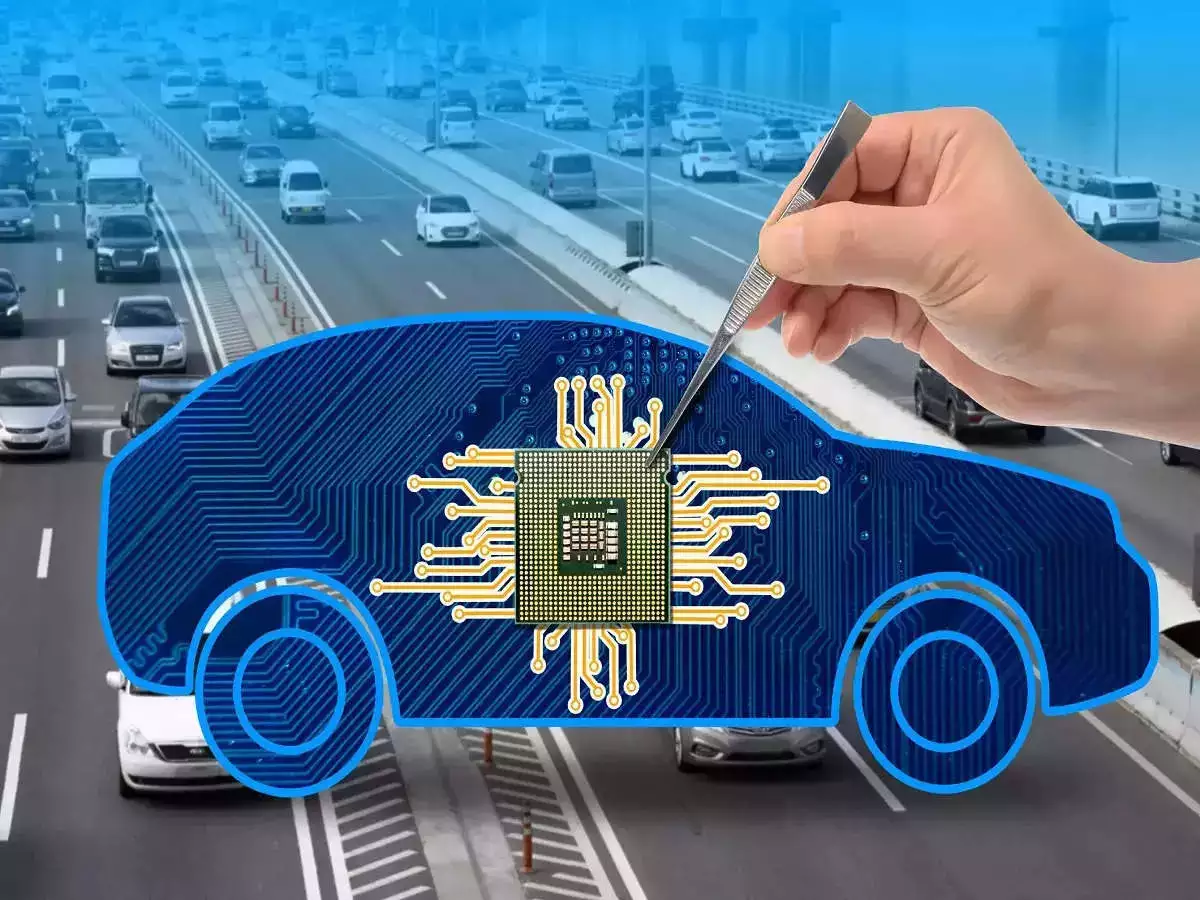The Automotive Chips industry is facing a shortage of electronic chips, hindering production and sales. This supply chain issue has been causing headaches for automakers for months and it looks like there is no end in sight. To understand why this problem persists and to assess its impact on the auto industry, this article will explore the reasons why automotive chips are still in short supply. We’ll examine how the global chip shortage affects car makers, their suppliers, and consumers alike.
Automotive Chips
The automotive industry is currently facing a global shortage of semiconductor chips, and the situation doesn’t seem to be improving anytime soon. The shortage has had a significant impact on automakers around the world, with some being forced to reduce production or even shut down certain plants temporarily due to the lack of chips.
One reason for this shortage is that the demand for semiconductor chips has increased significantly in recent years as more devices become connected and smart. This means that automakers are now competing with other industries for access to these essential components. Additionally, COVID-19 disruptions have caused supply chain issues that have further exacerbated the problem.
Another factor contributing to this crisis is the fact that automotive chips are typically designed specifically for each vehicle model and can take up to two years or more to develop. As demand fluctuates, it becomes challenging for chip manufacturers to keep up with the changing needs of automakers. Furthermore, many chip manufacturers have shifted their focus away from producing automotive chips towards higher-margin products like computer processors and smartphones.
In conclusion, while there are several reasons why automotive chips are still in short supply globally, what’s clear is that this issue will continue affecting automakers in both short and long-term ways. Until we see significant changes in how these components are produced and distributed across industries worldwide, we can expect continued challenges when it comes to meeting consumer demand for new cars fitted with advanced technologies.
Causes of Short Supply
One of the major causes of short supply in automotive chips is the ongoing COVID-19 pandemic. The pandemic has disrupted global supply chains, leading to shortages of raw materials and components needed for chip production. Additionally, many chip manufacturers had to reduce their workforce or temporarily shut down operations due to safety concerns.
Another cause is the increasing demand for electronic devices that require advanced chips, such as smartphones, laptops, and gaming consoles. This demand has put pressure on chip manufacturers who need to prioritize orders from their larger customers. As a result, smaller industries like automotive are left with limited access to these essential chips.
Lastly, political tensions between countries have affected trade relations and restricted the flow of goods across borders. In particular, the US-China trade war has impacted global semiconductor supply chains. Many companies are now looking for alternative suppliers outside China which can lead to longer lead times and reduced availability due to limited production capacity in new locations.
Impact of Shortage
The impact of the shortage of automotive chips has been significant in the industry. Car manufacturers have had to halt production lines, resulting in delays and losses. The demand for cars has increased due to people avoiding public transportation in light of the pandemic, while supply chains have been disrupted by factory shutdowns and border closures. This perfect storm has led to a shortage of essential components like automotive chips.
The automotive chip shortage is not only affecting car manufacturers but also suppliers and retailers who depend on these products to operate their businesses. The shortage has resulted in higher prices for car buyers, as dealerships try to make up for lost revenue during this challenging time. Additionally, many companies are facing potential layoffs or furloughs due to reduced production capacity caused by the chip shortfall.
In conclusion, the impact of the automotive chip shortage has been widespread across various industries and sectors related to car manufacturing. While there are efforts underway to address this issue, it will take some time before things return to normalcy. In the meantime, businesses must adapt and find ways to manage this crisis effectively without sacrificing profits and customer satisfaction.
Strategies to Overcome Shortage
One of the main reasons why automotive chips are still in short supply is the high demand for them. With more people buying cars, there has been a significant increase in the need for these chips. However, this demand has not been met by an adequate supply. Additionally, many automakers have had to shut down production lines due to COVID-19 restrictions and disruptions in the global supply chain.
To overcome this shortage, automakers can consider several strategies. One approach is to diversify their supplier base and work with multiple chip manufacturers instead of relying on just one or two. This can help mitigate risks associated with any potential disruption from a single supplier or region. Another strategy is to prioritize chip allocation based on critical vehicle models that generate higher revenue and profits.
Finally, automakers can also explore alternative semiconductor technologies that may be less affected by current shortages. For instance, some companies are looking into using silicon carbide (SiC) or gallium nitride (GaN) chips as substitutes for traditional automotive semiconductors. While these newer technologies may come at a higher cost initially, they could provide long-term benefits such as improved fuel efficiency and performance in electric vehicles.
The rise in Automotive Chip Demand
One of the main reasons why there is a significant rise in automotive chip demand is due to the increasing number of electronic features that are being integrated into modern vehicles. These features include advanced driver assistance systems (ADAS), infotainment systems, and electric powertrains. The growing popularity of electric vehicles has also contributed to the surge in demand for automotive chips.
However, despite the rising demand for these chips, there is still a shortage in supply. This shortage can be attributed to several factors such as disruptions caused by the COVID-19 pandemic, trade tensions between countries, and production challenges faced by semiconductor manufacturers.
Furthermore, given that automakers typically place orders for chips months in advance, it can be challenging to quickly respond to changes in consumer demand or supply chain disruptions. As a result, automakers may face delays and increased costs when trying to secure enough chips for their vehicles. Overall, the rise in automotive chip demand highlights both the opportunities and challenges faced by this industry as it continues its shift toward a more digital future.
Automotive Chip Innovations
Despite the growing demand for electronic components, automotive chip innovations are still facing short supply. The ongoing pandemic continues to exacerbate this issue, as many manufacturers have either ceased production or reduced their output. Additionally, the recent global semiconductor shortage has further complicated matters by creating a backlog of orders that companies are struggling to fulfill.
Another factor adding to the shortage is the increasing complexity of automotive chips, which require more advanced technology and materials. This makes them more expensive to produce and limits the number of manufacturers capable of producing them. Furthermore, automakers are requiring more specialized chips for their newer models, thereby limiting flexibility in production lines.
To address these challenges, some companies have begun investing in new manufacturing facilities and expanding their existing operations. Governments around the world are also working on initiatives aimed at supporting the semiconductor industry through funding and policy changes. However, it will likely take some time before these efforts lead to a significant increase in the supply of high-quality automotive chips that meet industry standards.
Conclusion
In conclusion, the shortage of automotive chips has exposed weaknesses in the global supply chain. The pandemic-related disruptions in production and shipping have caused a ripple effect throughout various industries, including automotive manufacturing. Additionally, the increased demand for electronic devices and home appliances during lockdowns further strained chip production capacity.
Furthermore, the trend towards increasingly sophisticated vehicles with advanced safety features and electric drivetrains has also played a role in creating this shortage. These new technologies require more powerful chips that are not as readily available as older models.
Overall, it is clear that there are multiple factors contributing to the current situation. Addressing these issues will require a collaborative effort from all sectors involved in chip production and distribution. However, with careful planning and investment in new facilities and resources, it is possible to mitigate these challenges and ensure a stable supply of automotive chips for years to come.










